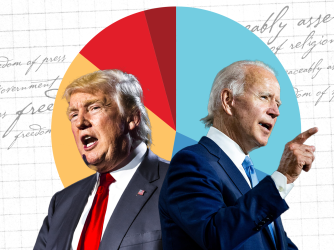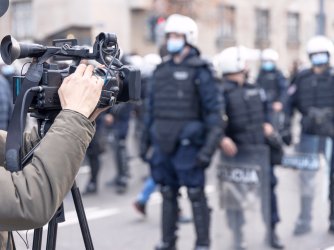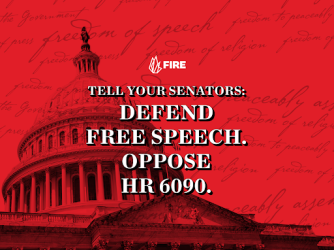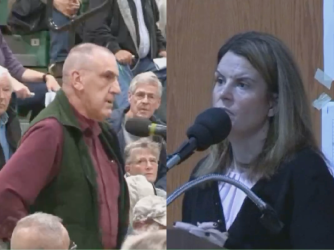Table of Contents
After administrative meddling, curtain drops on Santa Monica College class play just before premiere

Proving that it’s more difficult to create than to cancel, a play that Santa Monica College Theatre Arts Department students and faculty worked on since early in the semester was called off in a single day following campus outrage and administrative interference.
In mid-October, a week prior to what would have been opening night, the Southern California community college became embroiled in controversy over the play, “By the River Rivanna.” Written by playwright-in-residence G. Bruce Smith, directed by SMC Theatre Arts Director Perviz Sawoski, and produced by the Theatre Arts Department as part of an academic course, the play centers on a romantic relationship between a nineteenth-century slave and his master. In the words of dialect coach and adjunct instructor Crystal Robbins, “the central theme is about power in many forms of relationships.”
Unfortunately for students and faculty who hoped the show would go on, they’d receive a real-life lesson on the power of some in the campus community to make that outcome increasingly difficult.
SMC’s student newspaper, The Corsair, reported that opposition to the performance began “after members of the Pan-African Alliance and Black Collegians program attended a rehearsal and found the show ‘deeply distressing,’ according to the president of the Pan-African Alliance, Dr. Jermaine Junius.”
Among other objections, the alliance claimed that the play romanticizes the “legacy of slavery, sexual abuse, and exploitation,” is historically inaccurate, and “traffick[s] in stereotypic tropes.” Ultimately, 12 other “SMC employee-based organizations” also opposed the performance.
Had the dispute ended there — with some expressing displeasure about the show and others continuing to participate in it — the matter would have represented the sort of heated, sometimes unresolved debates one might expect to see on a public college campus. But two days before the scheduled premiere, administrators reportedly arrived at rehearsals demanding to interview each student in the class about the play’s content.
The next day, administrators again attended rehearsal, this time asking the students in the class to vote — in the administrators’ presence — on whether the play should proceed as planned, be delayed, or be canceled. Though a majority of students voted to either perform the show as scheduled or perform it later, the class continued to discuss the matter.
Ultimately, a second vote was held. This time, the students chose between performing the play only to invited guests or canceling it altogether. Again, a majority voted the show should go on, this time in the invite-only form. However, because most of the students felt it would be impossible to perform the show without some of the cast members who no longer wished to perform, they collectively decided to cancel it.
What happened at SMC is particularly egregious at a public college legally obligated to uphold the First Amendment, as students and professors at public institutions expect their expressive rights to remain untrammeled.
On Oct. 20, FIRE urgently wrote SMC right after the vote, encouraging the school to let the show go on if the involved students still desired that outcome. SMC replied, asserting that the faculty and students chose to halt production. Hearing more allegations about the administration’s improper role in the voting process and its leadup, we wrote the school again, this time condemning SMC for meddling in the affairs of the theater class, the rightful purview of professor Sawoski. Specifically, we argued that it’s not the role of public college administrators to “put faculty members’ constitutionally protected exercises of academic freedom to a vote.”
“Academic freedom affords faculty substantial breathing room to determine whether, when, and how to approach material germane to the topic of their course,” we said, “even if some, or many, find the material upsetting or offensive.”
In this situation, however, Sawoski was not afforded that breathing room. And as Smith, the playwright, relayed to The Corsair, he has “no reason to believe [the students] would have voted to cancel the play if the SMC administration hadn’t harassed them.”
What happened at SMC is particularly egregious at a public college legally obligated to uphold the First Amendment, as students and professors at public institutions expect their expressive rights to remain untrammeled. It also mirrors a broader cultural phenomenon on which FIRE has commented in the past: “jawboning.”
The Cato Institute’s Will Duffield defines jawboning as the use of “informal pressure — bullying, threatening, and cajoling — to sway the decisions of private platforms and limit the publication of disfavored speech.” The term is typically used in reference to government officials who use their influence to pressure social media platforms into suppressing speech. However, college administrators who interfere in pedagogical matters create similarly insidious incentives, ultimately contributing to the cancellation of expressive events and making campuses less hospitable to provocative or unorthodox ideas.
Especially in the context of a theater class, professors require the latitude to explore challenging characters and themes with their students, even if it upsets others. Indeed, discussing and creating compelling art often demands wading into controversial subjects and confronting ambiguity.
FIRE is calling on SMC to confirm that it will not interfere with faculty’s academic freedom rights in the future. We’re also asking the school to affirm that students will not face disciplinary action for participating in the play should the class choose to schedule the show for a later date. We’re asking for a response by Nov. 13.
As FIRE has said before, “Cancel culture cancels culture.” We hope that shedding light on this series of unfortunate events at SMC will guide campus leaders to foster campus environments where exploration, discussion, and the creative arts can flourish.
Recent Articles
FIRE’s award-winning Newsdesk covers the free speech news you need to stay informed.

New FIRE poll: Americans equally skeptical Biden or Trump will protect First Amendment rights

Qualified Immunity isn’t just for police officers



